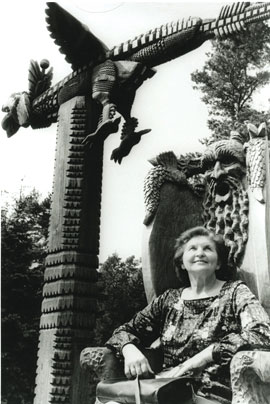 Marija Gimbutas (1921-1994), former Professor Emeritus of Archaeology at UCLA, contributed to what is considered to be one of the most significant academic watershed moments in women’s studies with her archeological and philosophical work on Neolithic culture and religion. A Lithuanian-American archeologist, she is best known for her research into the Neolithic and Bronze Age cultures of “Old Europe,” a term she introduced.
Marija Gimbutas (1921-1994), former Professor Emeritus of Archaeology at UCLA, contributed to what is considered to be one of the most significant academic watershed moments in women’s studies with her archeological and philosophical work on Neolithic culture and religion. A Lithuanian-American archeologist, she is best known for her research into the Neolithic and Bronze Age cultures of “Old Europe,” a term she introduced.
Old Europe referred to both the geographical area and social structures that existed before the Indo-European influence, and was based on her work on the cross-disciplines of archaeological artifacts, linguistics, ethnography and folklore that led her to posit the thesis that the European prehistoric culture was female-centered and worshiped a Mother Goddess as giver of all life. Gimbutas’ hypothosis that the Kurgan invasions brought an end to Old Europe and introduced new Indo-European languages to Europe was viewed with skepticism by many scholars in her time; in recent years her Kurgan theory was given support through advances in DNA testing.
In Gimbutas’ last book The Civilization of the Goddess, which synthesizes the work and theses of her previous books (Goddesses and Gods of Old Europe 1974/1982 and The Language of the Goddess 1989/1991), she wrote, “The primordial deity for our Paleolithic and Neolithic ancestors was female, reflecting the sovereignty of motherhood. In fact, there are no images that have been found of a Father God throughout the prehistoric record. Paleolithic and Neolithic symbols and images cluster around a self-generating Goddess and her basic functions as Giver-of-Life, Wielder-of-Death, and as Regeneratrix.” Further in Civilization of the Goddess Gimbutas outlines the symbolic understanding Old European societies had of the universe and the divine. She wrote, “The multiple categories, functions, and symbols used by prehistoric peoples to express the Great Mystery are all aspects of the unbroken unity of one deity, a Goddess who is ultimately Nature herself.” For a complete list of her publications see the Marija Gimbutas bibliography.
Her discoveries took on great symbolic importance for feminists across varied disciplines who found, in her vision of a peaceful, egalitarian, nature-revering society, a sense of hope for the future based on this foundation in the distant past. Unintended to her, Marija Gimbutas’ impact was so great that it reached beyond the scholarly community and helped fuel the women’s movement in society at large. Though scholars on methodological and ideological grounds have challenged her work, this very work fueled the initial tangible, scientific, and material support for the hypotheses that cultures existed wherein patriarchy did not rule, war and violence was not assumed as a cultural norm, and that there were, in fact, egalitarian social structures. In honor of her contribution to the mutual enrichment of cultures for universal understanding and peace, UNESCO designated Gimbutas among its milestone anniversary commemorations for 2021 in observance of her centenary year.
The Marija Gimbutas papers are held at OPUS Archives on Pacifica Graduate Institute’s Ladera Lane campus. Gimbutas’ personal library is also held by OPUS in The Joseph Campbell and Marija Gimbutas Library, located at the Lambert Road campus. The Campbell and Gimbutas Library is open to the public by appointment, or without appointment Sundays from 2:00-4:00pm.







